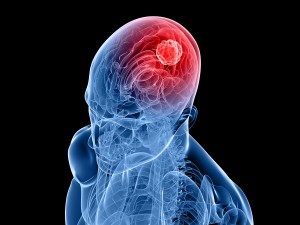In the first place brain cancer is perhaps one of the more emotionally charged diseases of man. In general, this is not only because of the realization that cancer often shortens a person’s life, but at the same time it changes the personality of the patient.
Truly, this can be very upsetting and emotionally draining for the family members . Sometimes the person gets diagnosed in the work-up of a seizure or because of headaches. Subsequently the patient may suddenly die in this case within only a few days or weeks as a result of a rapidly growing brain tumor.
At other times the patient may be alive for several years, but needs several surgeries or treatments for a recurrent brain cancer. In that case the personality, mentation and energy level tend to deteriorate as the cancer slowly spreads within the brain.
Certainly, often there has been a cancer elsewhere in the body (breast, prostate, lungs or melanoma of the skin) and brain metastases are part of that cancer spread. To emphasize, the physician orders an x-ray or MRI scan very quickly in that situation, as the neurosurgeon can often intervene in an early stage. Often the surgery will extend the patient’s lifetime to a certain degree. In about 2% of routine autopsies the pathologist finds a brain cancer as a surprise finding.
The following outline can only give a global overview of this very complex topic. There are about 15 primary cancers of the brain and spinal cord from a histological point of view and I will only mention the most common ones here.
References
I used my own clinical experience and the following references:
1. Cancer: Principles &Practice of Oncology, 4th edition, by V.T. De Vita,Jr.,et. al J.B. LippincottCo.,Philadelphia, 1993.Chapter 48.
2. Cancer: Principles&Practice of Oncology. 5th edition, volume 2. Edited by Vincent T. DeVita, Jr. et al. Lippincott-Raven Publ., Philadelphia,PA, 1997. Chapter 42, page 2013: Neoplasms of the Central Nervous System.
3. The Merck Manual, 7th edition, by M. H. Beers et al., Whitehouse Station, N.J., 1999. Chapter 177.
4. T Kilic et al. Cancer Res 2000 Sep 15;60(18):5143-5150.
5. Conn’s Current Therapy 2004, 56th ed., Copyright © 2004 Elsevier
6. Ferri: Ferri’s Clinical Advisor: Instant Diagnosis and Treatment, 2004 ed., Copyright © 2004 Mosby, Inc







